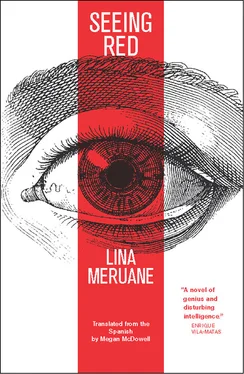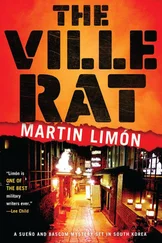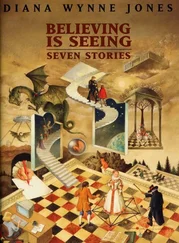stop
Behind an Ignacio steeped in the smell of cigarettes came Lekz, like an aseptic and pallid angel, suddenly gray, exhausted circles under his eyes. He did not look good. Am I going to die, doctor, or are you? Lekz made an awkward and resigned grimace. I fuzzily saw him lower his face and swell up with air. He would wait outside with Ignacio while I got out of bed and got dressed. And in the minutes that passed while I pulled up my skirt over my dirty underwear, put on my sweaty socks, my boots, pulled on my undershirt, scarf, sweater, and my anxiety over the verdict, I watched an infinite number of treasured and uneven memories parade before my sick eyes, memories of the times when I’d pretended my illness didn’t exist, moments that were falsely happy when I’d made myself think I could be someone else; they’d debilitated me and left me at the mercy of an estranged solitude that was mine alone. And I came out with my head high, ready to hear what Lekz had to tell me in the little office the hospital ceded us. The doctor cleared his throat more than ever. Lekz and Ignacio cleared their throats and I did too, it was contagious; I cleared my throat before singing to them, coldly, I’m ready, I’m all ears. I saw Lekz knead his head with all his fingers. I saw him rub his face, not knowing how to explain to me but resolved, no beating around the bush now, like a teletype machine, like he was reading a telegram. There are veins in your left eye. Stop. They’re new ones. Stop. Soon they will break the retina. Stop. For now the other eye is calm, but the blood is going to come back. Stop. You’ll be blind in no time. Stop. It was definitive. The blood, its possibilities, they had never really disappeared. They were part of my eyes. I felt Ignacio’s sweaty hand sliding over mine, Ignacio as a whole seeping away toward the floor. Ignacio now an insane color. Ignacio, I told him, leave me alone for a moment with the doctor. And when I heard the door close I leaned my elbows on the tiny, reeking table, I leaned forward and I told Lekz to light a cigarette for me. I know you smoke in secret, hiding it from your wife, from your patients, and most of all from Doris, hiding from yourself. I can smell the tobacco on your breath. Don’t say anything, and I’ll keep quiet too. Anyway, it doesn’t make sense to try to stop the destruction of my eyes anymore. Lekz opened an invisible little drawer and handed me a cigarette. He lit another one for himself, almost grateful to share his secret. I saw the blurry reflection of the lit end lighting up his eyes in the desolation of that Saturday. I saw my own puffs of ghostly smoke in the air while I thought about how to put it. We only have a transplant left, doctor, you owe it to me. Transplant, repeated Lekz in an agonized voice. Transplant, Lina, he mumbled, no longer doubting my name, and he added a couple of words that got tangled up on his tongue. A transplant is very delicate, he told me, but he was talking to himself in that solemn tone of his. Really very delicate, he said, as though I didn’t know. It’s only been tried on animals, never on humans. Doctor, I retorted, and I leaned so close to him my smoke burned his cheeks, I’m nothing but an animal who wants to stop being one. Lekz lit a new cigarette on the old one and, opening my file, thumbing through the infinite pages of my history, making a morose doodle around my ever-shorter name, he told me no. It wasn’t possible, he said. There were no eye banks, because no one donated dead eyes. It was believed, said Lekz, that memory lived in them, that the eyes were an extension of the brain, the brain peering out through the face to grasp reality. Some people thought the eyes were depositories of memory, he said, and others still believed that the soul was hidden there. It’s my only chance, I interrupted, and he was wasting time that I needed; my chance and yours, doctor. I stood up, squinted my eyes so he would feel like I was looking at him, that I wasn’t going to allow him anything but an immediate yes. Lekz looked at me in shock, his lips trembled, full of words that now he didn’t even dare to think. He cowered down a little in his chair. I heard his fingers drumming somewhere. Lekz was gathering a slow courage in that office, so silent in spite of the sound of the cars crossing the city. The world was so silent, I thought, Lekz so hushed in spite of his nervous fingers, Ignacio so lost in some hallway, pacing anxiously, Chile so far away and mute. And that’s what I was thinking when I found myself saying to him, illuminated, electrified, unsteady but sure of what was going to happen. Don’t move, doctor, I whispered. Wait for me here, I’ll bring you a fresh eye.
LINA MERUANE is one of the most prominent and influential female voices in Chilean contemporary literature. A novelist, essayist, and cultural journalist, she is the author of numerous short stories that have appeared in various anthologies and magazines in Spanish, English, German, and French. She has also published a collection of short stories, Las Infantas (Chile 1998, Argentina 2010), a book of essays, Viral Voyages (Palgrave, 2014), as well as three novels in addition to Seeing Red: Póstuma (2000), Cercada (2000), and Fruta Podrida (2007). The latter won the Best Unpublished Novel Prize awarded by Chile’s National Council of Culture and the Arts in 2006. She won the Anna Seghers Prize, awarded to her by the Akademie der Künste, in Berlin, Germany, in 2011 for her entire body of written work. Meruane received the prestigious Mexican Sor Juana Inés de la Cruz Prize in 2012 for Seeing Red. Meruane has received writing grants from the Arts Development Fund of Chile (1997), the Guggenheim Foundation (2004), and National Endowment for the Arts (2010). She received her PhD in Latin American Literature from New York University, where she currently serves as professor of World and Latin American Literature and Creative Writing.
MEGAN McDOWELL is a literary translator of many modern and contemporary South American authors, including Alejandro Zambra, Arturo Fontaine, Carlos Busqued, Álvaro Bisama, and Juan Emar. Her translations have been published in The New Yorker, McSweeney’s, Words Without Borders, Mandorla, and VICE, among others. She lives in Santiago, Chile and New York.
DEAR READERS,
Deep Vellum Publishing is a 501c3 nonprofit literary arts organization founded in 2013 with the threefold mission to publish international literature in English translation; to foster the art and craft of translation; and to build a more vibrant book culture in Dallas and beyond. We seek out literary works of lasting cultural value that both build bridges with foreign cultures and expand our understanding of what literature is and what meaningful impact literature can have in our lives.
Operating as a nonprofit means that we rely on the generosity of tax-deductible donations from individual donors, cultural organizations, government institutions, and foundations to provide a of our operational budget in addition to book sales.
Deep Vellum offers multiple donor levels, including the LIGA DE ORO and the LIGA DEL SIGLO. The generosity of donors at every level allows us to pursue an ambitious growth strategy to connect readers with the best works of literature and increase our understanding of the world. Donors at various levels receive customized benefits for their donations, including books and Deep Vellum merchandise, invitations to special events, and named recognition in each book and on our website.
We also rely on subscriptions from readers like you to provide an invaluable ongoing investment in Deep Vellum that demonstrates a commitment to our editorial vision and mission. Subscribers are the bedrock of our support as we grow the readership for these amazing works of literature from every corner of the world. The more subscribers we have, the more we can demonstrate to potential donors and bookstores alike the diverse support we receive and how we use it to grow our mission in ever-new, ever-innovative ways.
Читать дальше












